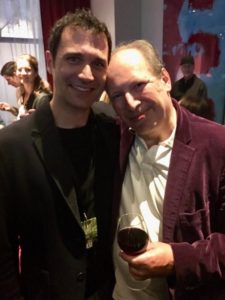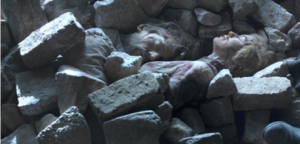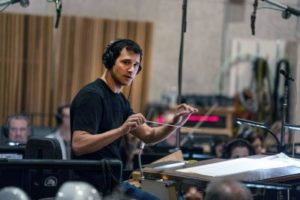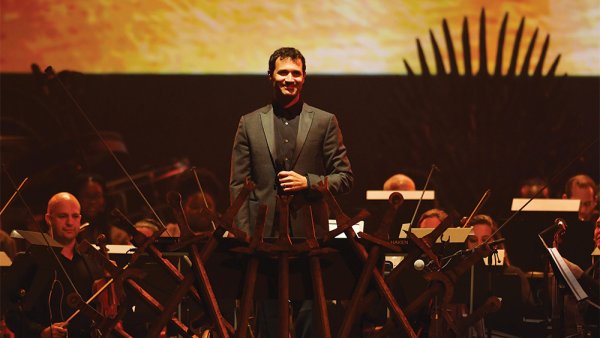I’d like to start by clarifying that HBO Watch is not officially affiliated with HBO in any way, so don’t mistake this for some self-congratulating editorial piece. I personally am merely a big enthusiast of HBO’s original shows but above all a fan of television in general. I’ve seen plenty of series in my life and enjoyed many of them, but I have never encountered something quite like what composer Ramin Djawadi did on his 8 years working on Game of Thrones.
If you’re a fan, you don’t need to be totally engrossed in all aspects of Game of Thrones to know it’s opening titles theme music by heart. It’s undoubtedly one of the most memorable music pieces to come out of a score album, and I’m sure plenty of people danced to some club remix of it in a party or enjoyed a simplistic version on a reception without even knowing they were listening to the opening theme of a television series. I remember even being in a wedding once where the bride and groom walked down the aisle to a violinist playing this music. The score of Game of Thrones captured the attention of most of the audience I’m sure, from the very beginning of the first episode, but it was nothing compared to what the future held in later seasons.
After 2 Grammy nominations and 6 Emmy nominations, including one win for Game of Thrones last year- it wasn’t much of a surprise to see Ramin Djawadi nominated once more on Emmy Nomination announcement day, for the episode “The Long Night” in the final season of Game of Thrones. Officially Djawadi is nominated for an Emmy for his work on Game of Thrones eighth season, but since it’s the last season of the show and the last time we’d hear him composing the various motifs of Westeros’ great houses, I think the best way to look at this nomination is as an overall achievement for all the work he’s done on the show since 2011.
What stands out the most in the Game of Thrones soundtracks to me is the use of the old musical element of ‘leitmotifs’- constantly recurring musical phrases associated with a particular element of the story. While the most obvious form of leitmotifs is theme music associated with certain characters, houses or even locations, if you listen closely you notice there are also theme keys associated with much more ambiguous ideas, such as a theme for the concept of honor or love and even conspiracy. Here lies the essence of what makes the Game of Thrones soundtracks so unique- the music compositions tell an entire story all by themselves. As the journey of the characters takes place on the screen, the music evolves in an 8 years journey to fit themselves to the state the characters find themselves at this moment in time. Key elements in the music can be just as hinting (or even telling) as clues depicted on screen, and if you focus you can just listen to a track from the soundtrack albums, close your eyes and imagine the entire scene with all the characters involved plays out in your head; if you are anything like me.
If the storytelling aspect of the music and the sheer grandiose style of compositions sounds familiar, it’s not by chance. After graduating summa cum laude from Berklee College of Music, Djawadi drew the attention of legendary film composer Hans Zimmer who recruited him to Remote Control Production and drew him to Hollywood under his wing. For those who don’t know, Zimmer is the composer responsible for many iconic soundtracks such as Christopher Nolan’s Dark Knight Trilogy, Pirates of the Caribbean, The Lion King and my
Describing the process of composing each season, Djawadi stated that show-runners David Benioff and D. B. Weiss were highly involved in every step. They would often tell him certain things he needed to put extra emphasis on, that for example might play a bigger role in a later season, and also set with him watching raw filmed material guiding him about their vision. A good example for that is when they asked him to compose the love theme for Jon and Daenerys for season 7, all the while knowing how that would end up on the next season; yet without telling ‘spoilers’ to Djawadi – “They said, ‘OK, this needs to be a really romantic theme, but make sure that it’s a love theme that can imply complications’” Djawadi said. “That’s how they started me out. They said things turn differently and things go wrong.”
As I stated before, it is highly noticeable that there was a lot of thought behind the story the music will carry throughout the show. First, it was important for Ramin to avoid cliches normally affiliated with the genre, so right at the beginning, he decided that the flute would not be incorporated in the score of the show at any point. Instead, he chose to put the emphasis on stringed instruments, and most notably the cello- which in his opinion captured the atmosphere of the universe the show takes place in much more than the fantasy or medieval compositions we usually hear. The decision of using music to support the different characters and plots, while expressing the emotions and moods of each scene was made right at the beginning- though he realized that with the vast amount of characters, houses and locations that the show features the audience might get confused or overblown by all the different key elements or themes. For this reason, he decided to incorporate the themes patiently and not all at once, so the audience could easily keep track at what’s going on. For example, the theme for House Stark was already present in the first episodes while the theme of Daenerys Targaryen built slowly throughout the first season, until the big climax in the season’s closing scene. It was only in the second season that House Greyjoy got his own theme for example- when Theon departed from the Stark camp and went to Pyke to visit his family. The second season also slowly introduced House Lannister’s infamous theme, “The Rains of Castamere,” that started to appear more prominently in the third season, as a preparation for its big role during the Red Wedding at episode 9. Slowly as Arya got stronger and more prominent as a character, her character developed themes of her own too, and so did the Dragons, the Army of the Dead and even Jon Snow after being raised from the dead- among many other characters as well.
Let’s zoom in now on the soundtrack for the eighth and final season, that after a few comprehensive listens and dozens of repeats of selected tracks I’ve come to realize is the best culmination this 8 years-long musical journey could have received. Just like everything else in the eighth season, the production took the music 
Another strong example is the scene in the last episode where Brienne of Tarth is writing Jaime’s deeds in the White Book after his death, with music incorporating key elements from “I Am Hers, She is Mine” that was originally featured in Rob Stark and Talisa’s wedding- almost as if Ramin married Jaime and Brienne all on his own. In its context, for me, this scene might be the most emotionally impactful combination of music and visuals in the show’s entire run. “It just shows the power of music, right?” Ramin said when asked about this scene. “There were no words [in the scene] but by putting that in there your imagination goes [into] where this could have gone. I wanted people to have that emotion, and have those thoughts. I’m glad it was picked up”.
The battle sequences took the more ‘epic’ motifs to a whole new level- for example with “The Last War” that took elements we already know and twisted them to sound like bells of apocalypse, and the last moments of the last episode incorporated pretty much everything of importance with “The Last of the Starks” that will give us a feeling of nostalgia for years to come, and ending with the track with the most fitting title “A Song of Ice and Fire”- a variation of the Main Titles music itself, while the show is ending in the exact same spot it started in episode 1. “The thought was to really create a bookend to the whole show,” he said describing this specific choice. “We have our main title song that really represents everybody and the entire series, and we thought there’s no better way to end the show than with our main title theme. But this time it was with a full choir. We have men and women and children actually singing it. We’ve heard that main title so many times at every beginning of the episode, so we wanted to leave the show with that — including the very last note on our small dulcimer.”
And of course, the recurring themes are not all there is to it. The season 8 soundtrack offers plenty of completely original compositions that don’t fall short from all the old ones we’re so familiar with. The best example could be “The Night King” that offers a beautiful climax to the most ambitious battle sequence ever filmed for TV. Three months later, personally I can’t stop listening to it again and again. “Jenny of Oldstones” (Ramin’s cello theme that appears on the soundtrack album, not the Florence Welch version) is hauntingly beautiful and had it been composed at an earlier season for a more prominent house it could have easily been just as iconic as the “Rains of Castamere” Lannister theme. Some battle sequence songs feature electronic instruments more heavily than ever before (kind of reminiscent of Zimmer’s ‘Dunkirk’ score) and “The Bells” for example is an ominous tension building music in a style we’ve never encountered before in the Game of Thrones soundtracks.
Ramin has gone through a vast range of musical instruments throughout the show, as he said several times that he persisted on always trying new things and incorporate new sounds. Some of the instruments used in his compositions could be identified by name only by real music fiends, while perhaps the most recognizable of all instruments, the piano, only made its first appearance in the ending of the sixth season, in the highly acclaimed “Light of the Seven” composition. That example shows that Ramin indeed gives credit to his listeners to notice the importance of the music and draw conclusions from it, as he stated several times that the 
Ramin described his effort on working on this specific score just as we’d expect- in a manner where the music has an important role in storytelling just as much as the visuals; “I always try to imagine what if we just turn the picture off? Will the music tell the story — tell us how to feel for these characters?” And as we’d expect, the show’s conclusion was harsh not only to us, the fans but also for the people who invested 9 years of their lives working on it. “I think it still hasn’t caught up with me fully that [it’s over]. The live concert tour is helping me with it, because I just don’t want to let go, just how many fans probably don’t want to let go of the show. It helps me to still be working on the music and just stay in that world longer. And yes, looking back it’s crazy when I think of how this all started out in 2011”.
The season 8 soundtrack is 2 hours long, so I couldn’t possibly talk about all of the tracks, though I’d probably have something to say about each and every one. I’d highly recommend going through this album, with an emphasis of anything that came out of the last episode- just to see how masterfully everything wraps up. Thankfully for us, we can still hear Ramin Djawadi here on HBO in the Nolan couple’s Westworld, a brilliant project in its very own ways. And for now, we can only be optimistic about maybe seeing Ramin’s name pop up in the Gam
Ramin Djawadi is up for a Creative Emmy for Musical Composition for Game of Thrones. Let’s see if he receives it.
The Creative Arts Emmy Awards will be announced this Sunday, September 15th.



















![[Book Review] The Blade Itself (The First Law Trilogy) by Joe Abercrombie](https://bendthekneegot.com/wp-content/uploads/2018/01/1516047103_maxresdefault-218x150.jpg)

















